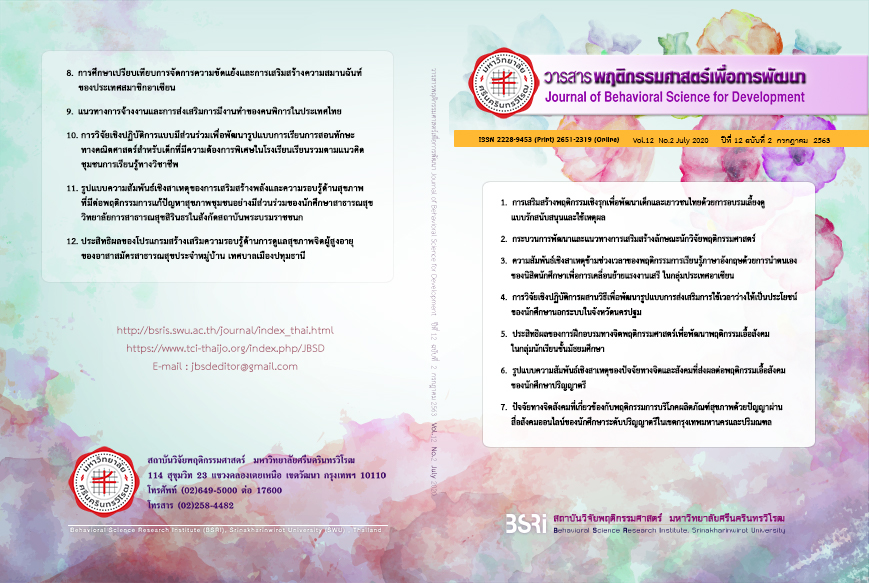The Mixed Methods Action Research to Develop a Model of Promoting useful Leisure Behavior of The Non-Formal Students in Nakhon Pathom Province
Keywords:
the mixed methods action research, leisure behavior, informal stude (non-formal education)Abstract
The purposes of this mixed methods action research were 1) to clarify the situation of leisure behavior, 2) to study the change of useful leisure behavior. The research process was qualitative and quantitative research. The research participants were 14 non-formal students at a learning center of a sub district. The results of the study about the situation of leisure behavior showed 3 aspects as follow 1) personal aspect, 2) social support, and 3) educational system arrangement. The leisure behavior was found at a moderate level (mean 3.13). Results from promoting useful leisure behavior program presented in terms of quantity, intensive, and quality of useful leisure. After participating through all activity, the students had statistically significant more useful leisure behavior than before participating (p<.05). Procedure for Promoting Useful Leisure Behavior of the Non-Formal Students were 1) analyzing problem, 2) enhancing knowledge and understandings of useful leisure, 3) empowering to learning of useful leisure, 4) learning by doing, and 5) creatively reflecting the results
References
Aslan, N. (2009). An examination of family leisure and family satisfaction among traditional Turkish families. Journal of Leisure Research, 41(2), 157-176.
Bandura, A. (2015). Moral Disengagement: How People do Harm and Live with Themselves. Macmillan Learning.
Bandura, A. (1986). Prentice-Hall Series in Social Learning Theory. Social Foundations of Thought and Action: A Social Cognitive Theory. Prentice-Hall, Inc.
Bandura, A., Ross, D., Webb, D., & Ross, S. (2013). Psychology Classics all Psychology Students should Read: The Bobo Doll Experiment. Create Space Independent Pub.
Bhanthumnavin, D. (2000). Importance of Supervisory Social Support and Its Implications for HRD in Thailand. Psychology and Developing Societies, 12(2), 155-166.
Chachanayai, P. (1984). Nanthanākān [Recreation]. Srinakharinwirot Univeristy.
Chamnongrak, S. (2005). Phonkān khaorūam prōkrǣm rǣng čhūngčhai kānchai wēlā wāng thī mī tō̜ withī chīwit kānchai wēlā wāng thī dī khō̜ng nakrīan matthayommasưksā tō̜n plāI [Effects of Participation in leisure motion program on positive leisure lifestyle of senior high school students] (Master’s thesis). Kasetsart University, Bangkok.
Chupradit, S. (2007). Phrưttikam sukkhaphāp [Health Behavior]. Chiang Mai University.
Dattilo, J. (2012). Inclusive Leisure Services: Responding to the Rights of People with Disabilities. Venture.
Dattilo, J. (2015). Leisure Education Program Planning. Venture Publishing.
Dattilo, J., & Kensinger, K. (2016). Application of Behavior Analysis in Leisure Contexts. Venture Publishing.
Electronic Transactions Development Agency Ministry of Digital Economy and Society. (2020). ETDA phœ̄i pī hoksipsō̜ng Khon Thai chai ʻinthœ̄net phœ̄m khưn chalīa sip chūamōng yīsipsō̜ng nāthī Gen Y khrō̜ng chǣ hā pī sō̜n [ETDA revealed that in the year 62, Thai People use the Internet Averaging 10 Hours 22 Minutes. Gen Y Won the Championship for 5 Years in a Row]. https://www.etda.or.th/content/thailand-internet-user-behavior-2019-press-release.html
Inoguchi, T. (2018). Leisure satisfaction in relation to quality of life using the Asia Barometer Survey data. In L. Rodriguez de la Vega, & W. Toscano (Eds). Handbook of Leisure, Physical Activity, Sports, Recreation and Quality of Life (International Handbooks of Quality-of-Life) (pp.19-30). Springer.
Ivankova, N. V. (2015). Mixed Methods Applications in Action Research: From Methods to Community Action. Sage.
Jinnge, P. (1997). Kān wikhro̜ phrưttikam læ kān prap phrưttikam (ʻēkkasān prakō̜p kānsō̜n) [Behavior Analysis and Behavior Modification]. Srinakharinwirot University.
Joel, R. A., Ramon, B. Z., Sarah, T. A., & Raymond, P. (2009). Family leisure satisfaction and satisfaction with family life. Journal of Leisure Research, 41(2), 205-223.
Kelly, R. J. (2012). Leisure (4th ed.). Sagamore Pub. Llc.
McLean, D., Hurd, A., & Anderson, D. M. (2019). Kraus' Recreation & Leisure in Modern Society (11th ed.). Jones & Bartlett Learning.
Mongkondaw, O., & Soopunyo, W. (2016). Nǣothāng songsœ̄m khwām fai rū fai rīan khō̜ng naksưksā nō̜k rabop nai phāk tawanʻō̜k chīang nư̄a dōi chai bō̜ribot chīwit pračham wan. [Guideline for enhancing learning curiosity of non-formal students in the northeastern region of Thailand using daily-life context.] Journal of Education Studies, 44(4), 246-266.
Oopkhaew, A. (2009). Sưksā phrưttikam kānchai wēlā wāng khō̜ng naksưksā phayābān sāttra bandit witthayālai phayābān sī Maha Sarakham [The Study of Leisure Time Behaviors in the Nursing at Srimahasarakham] (Research report). Srimahasarakham Nursing College, Mahasarakham.
Paggi, M. E., Jopp, D., & Hertzog, C. (2016). The importance of leisure activities in the relationship between physical health and well-being in a life span sample. Gerontology, 62(4), 450-458.
Patcharapongphan, K. (2010). Patčhai thī song phon tō̜ kānchai wēlā wāng thī mo̜som khō̜ng nakrīan chūang chan thī sām rōngrīan sāthit Mahāwitthayālai Rāmkhamhǣng [Factors affecting on appropriate time spending of the third level, secondary grade 1-3 students at the demonstration school of Ramkhamhaeng University, Bangkok] (Master’s thesis). Srinakharinwirot University, Bangkok.
Pierce, G. R., Sarason, B. R., Sarason, I. G., Joseph, H. J., & Henderson, C. A. (1996). Conceptualizing and assessing social support in the context of the family. In G. R. Pierce, B. R. Sarason, I. G. Sarason (Eds.). Handbook of Social Support and the Family: The Springer Series on Stress and Coping. Springer.
Rongkhankaew, W., Punvanich U., SuphawibulSuvimol, M., & Tangsujjapoj, S. (2014). Kānphatthanā prōkrǣm kānsưksā kānchai wēlā wāng sārap dek chan prathomsưksā tō̜n plāi nai sathān songkhro̜ [The development of leisure education program for children upper elementary school students in welfare institute]. Journal of Faculty of Physical Education, 17(1), 67-78.
Sarana, W., & Phingkuson, R. (2012). Phrưttikam kānchai wēlā wāng khō̜ng naksưksā laksūt rat pra sātsana sāttra bandit [Leisure Time Behavior of Students in the Bachelor of Public Administration Program] (Research report). Rambhai Barni Rajabhat University, Bangkok.
Shin, K., & You, S. (2013). Leisure type, leisure satisfaction and adolescents’ psychological wellbeing. Journal of Pacific Rim Psychology, 7(02), 53-62.
Sirirattanajitt, A. (2015). Khwāmsamphan rawāng phruttikam kānchai wēlā wāng kap rūpbǣp kānrīanrū khō̜ng naksuksā radap parinyā trī mahāwitthayālai hāt yai [The relationship between leisure behavior and learning styles of First-Year undergraduate students, Hat Yai University]. The Journal of Library and Information Science Srinakharinwrot University, 8(1), 26-37.



